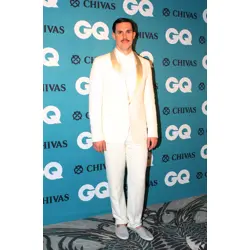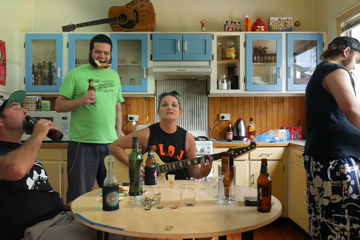 Sam Sparro
Sam SparroWith his return to Australia for an all-too-brief tour with a full band that includes members of Basement Jaxx, Sam Sparro's label has decided to reissue his second album, Return To Paradise. Originally released in June this year, it's now appeared in a special digital-only repackage dubbed Re-Return To Paradise, with seven bonus remixes, two of them previously unreleased. It's five years, of course, since Sparro released his eponymous debut album, featuring the single Black And Gold; the song stormed to number two on the UK charts and number four here. The album went top five in the UK, selling more than 100,000 copies and garnered Sparro five ARIA nominations and a Grammy nod in 2008.
The clip for Black And Gold went on to win the Best Dance Video gong at the 2009 MTV Awards and Sparro won the Outstanding Music Artist gong at the GLAAD Media Awards that year. The pressure was certainly on then to come up with a strong second album, and it's little wonder it took him five years to release Return To Paradise, though it turns out it wasn't a case of lack of inspiration, something quite surprising to anyone who assumed Sparro was merely a neo-soul or dance club artist.
“It started out very differently to how it ended up,” Sparro admits. “Just the tone of everything started out as quite, I don't know, more aggressive. I was very much listening to a lot of post-punk and things like The Clash and James White & The Blacks [actually late-'70s New York jazz-punks The Contortions in disguise]; sort of drums, bass, keys and saxophone was where I wanted to start out, and then I went back to my roots, you know, listening to a lot more vocal music, soulful stuff and disco and funk and, yeah, kind of evolved into that.”
As he worked on various ideas for the album, Sparro also spread his wings a bit and started collaborating with a variety of other writers, the bulk of his first album having been co-written with his main co-producer, Jesse Rogg.
Don't miss a beat with our FREE daily newsletter
“I enjoy collaborating a lot more than I used to. I used to shy away from it and I think now, having a more diverse and better selection of people to collaborate with, people who are willing to collaborate with me, it's more exciting for me and it helps to turn and open a new page. [It] just helps to sort of open the doors and windows a bit. Especially when you get stuck, with your own brain, your own patterns.”
Another move was towards more personal, if not necessarily confessional, lyrics.
“I think you get the best material working with somebody who's also an open book. It helps to have a good rapport with the person that you're writing with. I think Isabella Summers from Florence & The Machine, who wrote Shades Of Grey with me, which is sort of like a bleeding heart break-up song; we met that day and we spent 12 hours in the studio, we started and finished the song in that day, which is very rare, for me at least, we just had an instant connection and she's crazy,” at which point Sparro breaks into a laugh. “I think working with crazy people brings out a lot of great things because they just bring an insane energy that make me feel really secure!”
Just for the record, Shades Of Grey is not referencing that book, which wasn't the phenomenon it became at the time of its writing, so Sparro only suggests 16 shades of grey, though he in fact has been thinking about “doing a video for the song which has some sort of bondage references”. Another collaborator Sparro turned to was Swedish pop singer Erik Hassle, the pair writing the album's second single, I Wish I Never Met You, together.
“The song we wrote was actually meant to be for his record, but I had come up with the idea of 'wish I'd never met you', 'cause that was where I was at at the time, and then he said, 'You know, I think this is really your song, you should do it,' and I'd already committed to making this, like, joyful disco record, but I wanted then to give the album more of a narrative, you know, an up and a down and a story, so it worked.”
As Sparro moved from one frame of mind, predicated to a great extent on a bitter break-up, to a more celebratory one that ultimately informed the shape of the final album, he wrote some 60 songs, so the delay between first and second album certainly wasn't down to writer's block. What ultimately proved the key to just what sort of album Return To Paradise would become was his increasing fascination with a particular time and place – New York City, 1979.
“I think the city itself in that time really fascinates me,” Sparro begins. “I've always been slightly obsessed with it and when I think about the types of people that used to meet and connect in New York at that time, you'd have Mick Jagger and Liza Minnelli and Andy Warhol and Deborah Harry, those people at the same table together, you know, I think that's just a real amazing time in culture and in pop culture. And I think about what was happening in New York in terms of it being a melting pot of cultures and at the forefront of the equal rights movement in America and the role that disco music played in that in sort of bringing people together, it just really excites me, so I went digging through the crates and really researched that period a lot and Larry Levan, the DJ that was such an important part of that scene, his musical taste really inspired this album. That's part of the reason why I called it Return To Paradise, 'cause he was the DJ from the [NY nightclub] Paradise Garage.”
Also coming into New York were the sounds of Philadelphia – Philly soul, as well as the rock/pop/soul mash-up of Prince – colliding with the disco of Nile Rodgers and Chic, and of course Detroit's Motown and Memphis' Stax, elements which are thrown into Sparro's melting pot. The other thing about Return To Paradise is that, unlike the debut album, it's very much a live, band-oriented album.
“Yeah, that was important for me because I felt like pop music had become so flat-sounding and everything was so digital and so polished that for me, it was missing a real human element and a vulnerability and a soulfulness. So that's what I wanted to bring to the record. So there are some amazing players on the record, some of the greatest players in the world at the moment I think, like Stuart Zender, who was the founding bass player from Jamiroquai, who's like one of the funkiest bass players around; people that are in my band still that I travel with – Charlie Wilcox, my keys player, he's playing all over the record. Felix Bloxsom plays drums on a lot of stuff, when he and I went to primary school together and now he's a big touring drummer, plays with Sia, MIKA and all sorts of people, and he's also a remixer now who goes by the name Plastic Plates.”
Sam Sparro will be playing the following shows:
Friday 7 December - The Standard, Sydney NSWSaturday 8 December - Homebake Festival, The Domain, Sydney NSW
Sunday 9 December - Prince Bandroom, Melbourne VIC















